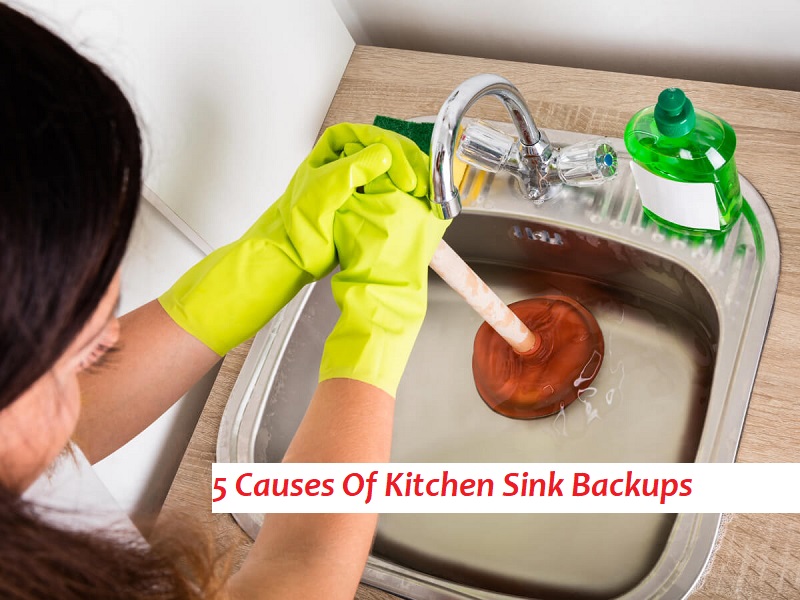A backed-up kitchen sink is a common household problem that can quickly become a major hassle. Whether you’re trying to wash dishes, prepare food, or simply rinse off your fruits and vegetables, a clogged sink can put a damper on your daily routine. The good news is that most kitchen sink backups are caused by a few common culprits and can be easily resolved with some basic household items. In this article, we will explore 5 of the most common causes of kitchen sink backups and provide tips on how to unclog them and prevent them from happening again.

Food Particles and Sink Blockage
Food particles are the leading cause of kitchen sink backups. Over time, these small bits of food can accumulate in your drain and create a blockage that prevents water from flowing freely. This can happen for a variety of reasons, including washing dishes without properly scraping off excess food, rinsing large amounts of food down the drain, or even just regular use of your sink over time. Here are two methods you can try to unclog your sink if it is blocked by food particles:
Use a Plunger
A plunger is a simple and effective tool for clearing clogs in your sink. To use a plunger, place it over the drain and pump it up and down vigorously. This action creates suction that can dislodge any food particles that are blocking the drain. If the first attempt does not work, try adding some water to the sink to create more pressure. You may need to repeat this process a few times to completely clear the clog.
Use a Drain Snake
If a plunger doesn’t do the trick, you can also try using a drain snake. A drain snake is a long, flexible tool that is designed to reach deep into your pipes and remove any clogs. To use a drain snake, insert it into the drain and turn the handle to feed the snake down the drain. Once you reach the clog, give the handle a few twists to grab onto any debris and pull it out. This method may require a bit more effort, but it is usually effective in removing stubborn food particle clogs.
Grease and Oil Buildup
Another common cause of kitchen sink backups is the buildup of grease and oil in your pipes. When cooking, fats and oils from foods can solidify and stick to the walls of your pipes, creating a layer of buildup that can trap other debris and cause a blockage. This is especially common in households that do not have a garbage disposal unit. To unclog your sink from grease and oil buildup, you can try the following methods:
Boiling Water
One of the simplest ways to remove grease and oil buildup in your sink is by pouring boiling water down the drain. The hot water helps to break down the solidified fats and oils, allowing them to flow through the pipes more easily. This method is best used as a preventative measure and can also help to keep your pipes clean and free of any accumulation.
Baking Soda and Vinegar
Another effective way to remove grease and oil buildup is by using a mixture of baking soda and vinegar. First, pour half a cup of baking soda down the drain, followed by one cup of vinegar. Let this mixture sit for 15 to 20 minutes before flushing it down with hot water. The chemical reaction between the baking soda and vinegar helps to break down the grease and oil, while the hot water helps to flush it away.
Coffee Grounds and Drain Problems
While coffee grounds may seem small and harmless, they can actually cause significant problems in your kitchen sink. When coffee grounds are washed down the drain, they can stick to the inside of your pipes and create a sludgy mess that impedes water flow. To prevent this issue, never pour coffee grounds down the drain. Instead, dispose of them in the trash or use them as compost for your garden. If your sink is already clogged with coffee grounds, here are two methods you can try to unclog it:
Salt and Hot Water
Salt is a natural abrasive that can help to remove coffee grounds from the walls of your pipes. First, pour a handful of coarse salt down the drain, followed by a kettle of boiling water. The salt will help to scrub away the grounds, and the hot water will flush them out of the pipes.
DIY Drain Cleaner
You can also make a homemade drain cleaner using ingredients you likely already have in your kitchen. Mix equal parts white vinegar, baking soda, and salt in a cup or bowl. Pour this mixture down the drain and let it sit for about 30 minutes. Then, pour boiling water down the drain to flush it out. This solution is gentle yet effective and can help to remove both coffee grounds and other debris from your drain.
Dish Soap and Sink Clogs
Dish soap is another household item that can contribute to sink clogs. While dish soap itself is not the problem, it can create a buildup of bubbles and suds that can trap debris and lead to a clogged sink. This often happens with dishwashers, where leftover soap residue can accumulate in the drain and cause a backup. Here’s what you can do to prevent and unclog a sink blocked by dish soap:
Run Hot Water
To prevent dish soap buildup in your sink, make sure to run hot water through your pipes after doing dishes. This will help to dissolve any soap residue and allow it to flow through the pipes instead of sticking to the walls.
Use Vinegar and Baking Soda
If your sink is already clogged from dish soap buildup, you can use the same method as mentioned earlier with baking soda and vinegar to help break down the suds and clear the drain.
Inadequate Water Flow
Sometimes, a kitchen sink backup may not be caused by any specific item or debris, but rather by inadequate water flow. This can happen if there is an issue with your plumbing system, such as incorrect pipe sizing or a clogged mainline. Here are a few things you can check to ensure that your sink has adequate water flow:
Check Other Drains
If multiple drains in your house are experiencing slow water flow, it is likely a sign of a larger plumbing issue. In this case, it is best to call a professional plumber to assess the situation and make any necessary repairs.
Check the P-Trap
The P-trap is a curved section of pipe under your sink that is designed to prevent sewer gases from entering your home. However, this trap can also trap debris and cause a clog if it becomes too full. You can check your P-trap by placing a bucket under it and unscrewing the connections. If it is clogged, remove any visible debris and clean it out before reattaching it.
Check the Mainline
If you suspect that your mainline is clogged, it is best to call a professional plumber to address the issue. A clogged mainline can cause backups in all your household drains and requires specialized equipment and expertise to clear.
Q&A
Q: What can I do to prevent sink backups?
A: To prevent sink backups, be mindful of what you are putting down your drain. Avoid washing large amounts of food down the drain and always scrape off excess food into the trash before washing dishes. Also, make sure to run hot water through your pipes regularly to prevent any buildup.
Q: Can I use chemical drain cleaners to unclog my sink?
A: It is generally not recommended to use chemical drain cleaners. These products contain harsh chemicals that can damage your pipes and harm the environment. They can also be dangerous if they come into contact with skin or eyes. Stick to more natural methods, such as those mentioned in this article, to unclog your sink.
Q: How often should I clean my sink drains?
A: It is a good idea to clean your sink drains at least once a month to prevent buildup and maintain proper water flow. Regular maintenance can also help to identify any potential issues before they turn into major problems.
Conclusion
A backed-up kitchen sink is a frustrating and inconvenient issue that most homeowners will face at some point. Fortunately, most kitchen sink backups are caused by a few common culprits and can be resolved with some simple household items and a little bit of know-how. By being mindful of what you put down your drain and performing regular maintenance, you can prevent sink backups and keep your kitchen running smoothly. If you are unable to unclog your sink using the methods mentioned in this article, it is best to call a professional plumber for assistance. Remember, safety should always be a top priority when dealing with any plumbing issues.

Related posts: